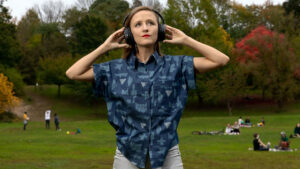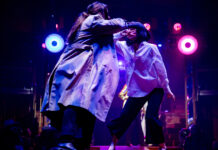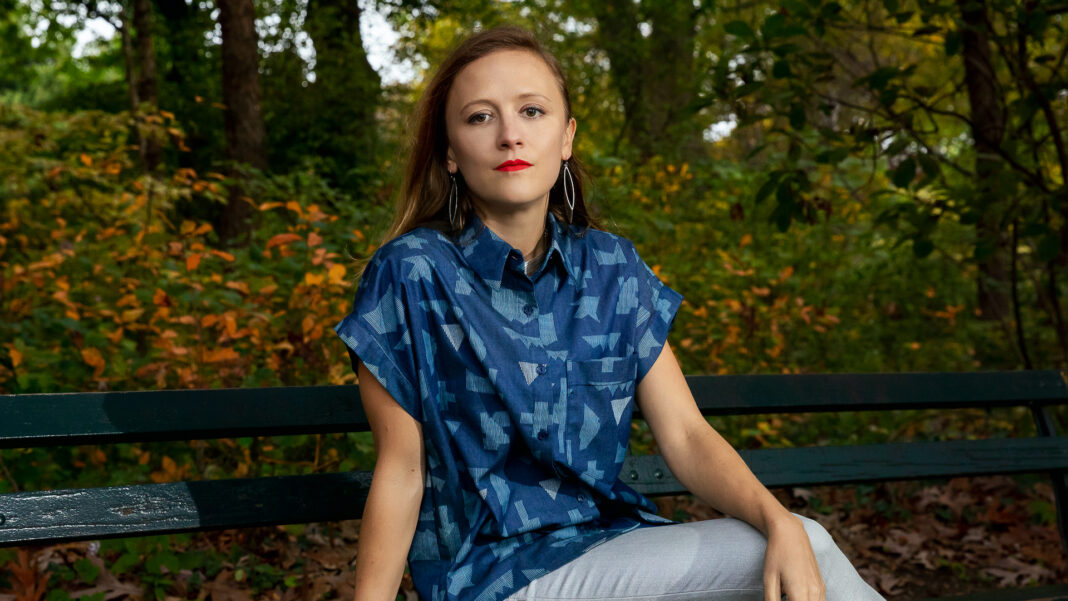So much has happened to and because of composer Ellen Reid since I last spoke to her four years ago. She participated in the online series Desert In with James Darrah and Boston Lyric Opera. She composed music for a series called Soundwalk which combines music listened to through headphones with walks in public space in Athens (Greece), Los Angeles, New York, San Francisco, Virginia Beach and more. She was also awarded the 2019 Pulitzer Prize in music for p r i s m, her opera which had a libretto by Roxie Perkins.
All that success would certainly lead to multiple opportunities for both her existing works and for the commission of new works. But then COVID happened and works stayed on the shelf until performances resumed. As restrictions lifted the opportunity for world premieres came back, but Reid wanted to revisit those works to see what they have to say now as opposed to what they might have said had they been performed as previously scheduled.
Amongst those works is Floodplain which is being given its world premiere by the Los Angeles Chamber Orchestra in three concerts beginning on May 12th. There was also TODAY AND TODAY AND TODAY AND TODAY AND TODAY AND TODAY AND TODAY AND TODAY AND TODAY AND TODAY which had its world premiere in February with the Seattle Symphony.
A lot to discuss with Reid for sure. What follows are excerpts from our conversation that have been edited for length and clarity.
What impact did winning the Pulitzer Prize, which you have described as “positive trauma,” have on you and your work?
I think it’s hard to know because you don’t know what the other side looks like. But I do think that as someone who has ideas that are outside the box, it’s allowed for me to have them heard a little easier, which is all the difference in the world, really.
And I think the biggest challenge for any composer today once you get a commission is finding where performances two, three, four and five are going to be.
Totally. But also you make getting a commission sound really easy.
Based on the conversations that I’ve had with other composers, commissions are easier to get than additional performances.
It’s true. Also, I like collaborating. I like things that are often a little nontraditional. So being able to bring those things into the world, there’s just a little bit more space to dream.
Floodplain was scheduled to premiere two years ago. You’ve stated that the pandemic allowed you a chance to revisit the work before LA Chamber Orchestra performs the work. Can you describe the fundamental changes between what you had written and what is being performed?
I have a few different ways to explain it. So the way that I like to work is I like to work on something a lot and then kind of put it on a shelf and work on other things and then come back to it, look at it, work on it a lot, put on the shelf and then when the deadline comes, clear everything off. You know, chop it up, mix it up, make it come together again.

I was on the second time of working through the material when COVID hit. So it wasn’t like I’m done. Final note. I had a lot of themes, a lot of material. I knew how I wanted some of it to flow.
I just made the commitment during COVID after things kept getting postponed that at a point I wasn’t going to work on something until I knew it was going to happen – as much as one can ever know anything, which is never. I decided to not work on things that weren’t within view. And so this one stayed on the shelf for a long time. I sometimes think about – this is so dorky – but think about composing like baking. You know, where part of the process of certain breads is this proofing* process? And some of them need to proof and some of them that changes the texture of the bread. So this piece proofed for a very long time.
When I got it down off the shelf I was like, What? What is this? What are you and what does this want to be? How can this feel relevant now? The work maintains a lot of the melodic themes and some of the chordal gestures. There is the rhythmic section and some other things that weren’t in the original sketches that kind of emerged from the long proof process.
Do you think that those who want to can find insight into your experience or your perspective of the COVID era or the pandemic itself?
That’s a little strong, I think. How to answer the question? It’s less direct. You know, the thing I like about the word Floodplain is it implies sometimes things go sideways. Not every day. Sometimes it’s going to flood and then otherwise it’s really fertile. So I think this kind of unpredictability, this kind of unsettledness that I still feel. I’m learning to trust and make plans again. I think some of those things are certainly somewhere in the work, but it’s not very specific.
Did the pandemic allow you time for introspection and did that change the way you thought about your work and/or how you want to express yourself?
I didn’t sit down and say, here’s what I want, X, Y, Z. But I think that any time anyone goes through anything challenging you just get to know yourself better. And you get to learn what what matters and that changes. I had to sit with myself a lot. There wasn’t as many distractions and there was a lot of unknown. And sitting with the unknown brought up some new things I’m interested in and things that I’m not interested anymore in a very clear way that it might have just taken a lot more time to find had we not had that experience.
I want to talk to you about Lunar Composition Lab, which I think is such an incredible thing that you and Missy Mazzzoli are doing in supporting female, non-binary and gender nonconforming composers. You’re six years in at this point. What impact would you like Luna and its graduates and fellows to have on the future of contemporary music?
Great question. And the answer is kind of a non-answer, which is I want something that we can’t even see. For these fellows and alums, the fact they have their community, they have role models, they have mentorship, they have doors opening for them. I want for them to go somewhere that Missy and I and you can’t even envision. That’s what I want.
I know you’ve talked about how every project starts with a blank page. In Stephen Sondheim’s Sunday in the Park with George the first words are “White. A blank page or canvas. The challenge, to bring order to the whole through design. Composition. Tension. Balance. Light and harmony.” Do you see your challenges as more similar or more different than as it is expressed in the opening moment of that musical?
I’m exploring my relationship right now with the blank page. I don’t know if that’s really accurate because we live in this multitude of our own imagination, so that the blank page is never blank. So I’m exploring how to start each piece actually with something on the page. Whether it’s finding a fragment of something and saying this is where we’re starting or the last pitch of the piece I just wrote. How actually to avoid the blank page because one hand it will be blank and it won’t be blank no matter what you do.
*proofing: the final stage of allowing dough to rise before baking
Main photo: Ellen Reid (Photo by Erin Baiano/Courtesy Los Angeles Chamber Orchestra)











